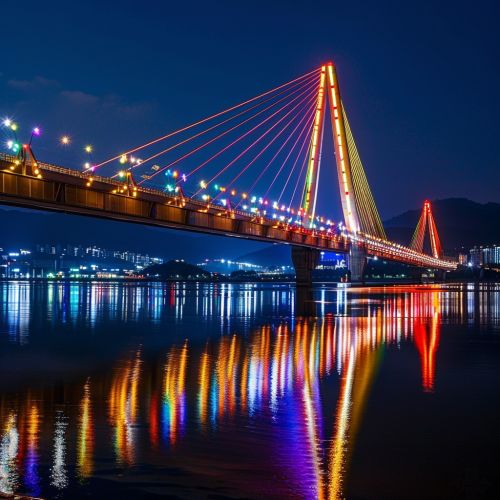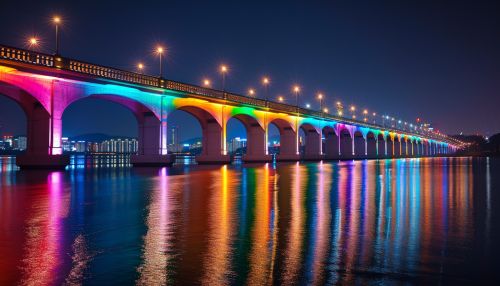Daejeon
Introduction
Daejeon is a metropolitan city located in the central region of South Korea. It is one of the country's major urban centers and serves as a hub for science, technology, and education. The city is known for its advanced research institutions, vibrant cultural scene, and strategic location, which makes it a significant player in South Korea's economic and technological landscape.
Geography and Climate
Daejeon is situated in the central part of South Korea, approximately 160 kilometers south of Seoul. The city covers an area of about 539.85 square kilometers and is bordered by the cities of Sejong, Gongju, and Okcheon. The geographical coordinates of Daejeon are 36.3510° N latitude and 127.3850° E longitude.
The climate in Daejeon is classified as humid continental, characterized by four distinct seasons. Summers are typically hot and humid, with average temperatures ranging from 25°C to 30°C. Winters are cold and dry, with temperatures often dropping below freezing. The city receives an annual average precipitation of approximately 1,200 millimeters, with the majority of rainfall occurring during the summer monsoon season.
History
Daejeon's history dates back to the Joseon Dynasty, when it was a small village known as Hanbat. The city's development accelerated during the Japanese colonial period, particularly with the construction of the Gyeongbu Railway in 1905, which connected Seoul and Busan. This infrastructure development transformed Daejeon into a significant transportation hub.
After the Korean War, Daejeon experienced rapid urbanization and industrialization. In 1989, the city was designated as a Metropolitan City, reflecting its growing importance. The establishment of the Daedeok Science Town in the 1970s further cemented Daejeon's status as a center for scientific research and innovation.
Economy
Daejeon's economy is diverse, with key sectors including technology, education, and government services. The city is home to several major research institutions and high-tech companies, particularly in the fields of electronics, biotechnology, and information technology.
The Daedeok Innopolis, also known as Daedeok Science Town, is a major research and development hub in Daejeon. It hosts over 20,000 researchers and numerous research institutes, including the Korea Advanced Institute of Science and Technology (KAIST), the Electronics and Telecommunications Research Institute (ETRI), and the Korea Research Institute of Bioscience and Biotechnology (KRIBB).
The presence of these institutions has fostered a strong innovation ecosystem, attracting both domestic and international companies to establish research facilities in the city. Additionally, Daejeon is a key administrative center, housing several government agencies and public institutions.
Education
Daejeon is renowned for its educational institutions, which play a crucial role in the city's development as a knowledge-based economy. The city is home to several prestigious universities and research institutes that contribute to its reputation as a center for scientific and technological advancement.
KAIST is one of the most prominent institutions in Daejeon, known for its cutting-edge research and high academic standards. The university offers a wide range of programs in science, engineering, and technology, attracting students and researchers from around the world.
Other notable educational institutions in Daejeon include Chungnam National University (CNU), Hanbat National University, and the Korea University of Science and Technology (UST). These institutions collaborate closely with the research institutes in Daedeok Innopolis, fostering a dynamic environment for innovation and knowledge exchange.
Culture and Tourism
Daejeon boasts a rich cultural heritage and offers a variety of attractions for visitors. The city is home to several museums, parks, and cultural centers that showcase its history and artistic achievements.
The Daejeon Museum of Art is a prominent cultural institution, featuring a diverse collection of contemporary and traditional artworks. The National Science Museum, located in Daedeok Innopolis, offers interactive exhibits and educational programs that highlight the city's contributions to science and technology.


One of the city's most iconic landmarks is the Expo Science Park, which was established for the 1993 Daejeon Expo. The park features various pavilions, exhibition halls, and the Expo Bridge, a striking architectural structure that has become a symbol of the city.
Daejeon is also known for its natural beauty, with several parks and recreational areas that offer opportunities for outdoor activities. The Gyeryongsan National Park, located near the city, is a popular destination for hiking and enjoying scenic landscapes.
Transportation
Daejeon is a major transportation hub, with well-developed infrastructure that facilitates easy access to other parts of South Korea. The city is served by an extensive network of highways, railways, and public transportation systems.
The Daejeon Station is a key railway station on the Gyeongbu Line, connecting the city to Seoul, Busan, and other major cities. The KTX high-speed trains provide rapid transit options, significantly reducing travel times between Daejeon and other urban centers.
The city's public transportation system includes buses and a subway line, which offer convenient and efficient options for commuting within Daejeon. The Daejeon Subway Line 1 spans approximately 22.6 kilometers and connects several key areas of the city.
Science and Technology
Daejeon is widely recognized as a leading center for science and technology in South Korea. The city's development as a hub for innovation is largely attributed to the establishment of Daedeok Innopolis, which has become a focal point for research and development activities.
Daedeok Innopolis hosts a concentration of research institutes, universities, and high-tech companies, fostering a collaborative environment for scientific advancement. The Korea Advanced Institute of Science and Technology (KAIST) is a key player in this ecosystem, conducting cutting-edge research in various fields, including robotics, nanotechnology, and artificial intelligence.
The Electronics and Telecommunications Research Institute (ETRI) is another major institution in Daejeon, known for its contributions to the development of telecommunications technologies. ETRI has played a pivotal role in the advancement of mobile communication standards, including the development of 4G and 5G technologies.
The Korea Research Institute of Bioscience and Biotechnology (KRIBB) is a leading research institute focused on biotechnology and life sciences. KRIBB conducts research in areas such as genomics, bioinformatics, and biopharmaceuticals, contributing to the advancement of medical and agricultural technologies.
Government and Administration
Daejeon serves as an important administrative center in South Korea, housing several government agencies and public institutions. The city is the location of the Daejeon Metropolitan Government, which oversees the administration and development of the metropolitan area.
The National Government Complex in Daejeon is a significant administrative hub, hosting various government ministries and agencies. This complex plays a crucial role in the implementation of national policies and the coordination of government activities.
Daejeon is also home to the Korea Institute of Public Administration (KIPA), which conducts research and provides training programs for public officials. KIPA's work contributes to the development of effective governance practices and the enhancement of public administration in South Korea.
Demographics
As of the latest census, Daejeon has a population of approximately 1.5 million residents. The city is characterized by a diverse demographic profile, with a mix of age groups and cultural backgrounds.
The population of Daejeon has been steadily growing, driven by factors such as urbanization, economic opportunities, and the presence of educational institutions. The city's population density is relatively high, reflecting its status as a major urban center.
Daejeon is known for its vibrant expatriate community, with many foreign nationals residing in the city for work or study. The presence of international research institutions and multinational companies has contributed to the city's cosmopolitan atmosphere.
Healthcare
Daejeon offers a comprehensive healthcare system, with a range of medical facilities and services available to residents and visitors. The city is home to several major hospitals, including Chungnam National University Hospital, Daejeon St. Mary's Hospital, and Eulji University Hospital.
These hospitals provide advanced medical care and are equipped with state-of-the-art technology. They offer a wide range of specialties, including cardiology, oncology, neurology, and orthopedics. The presence of these institutions ensures that residents have access to high-quality healthcare services.
In addition to hospitals, Daejeon has numerous clinics, pharmacies, and wellness centers that cater to the healthcare needs of the community. The city's healthcare system is supported by a network of public health centers that provide preventive care and health education programs.
Sports and Recreation
Daejeon has a vibrant sports culture, with various facilities and programs that promote physical activity and recreation. The city is home to several sports teams and hosts numerous sporting events throughout the year.
The Daejeon World Cup Stadium is a prominent sports venue, originally built for the 2002 FIFA World Cup. The stadium has a seating capacity of approximately 40,000 and serves as the home ground for the Daejeon Hana Citizen, a professional football club that competes in the K League.
In addition to football, Daejeon has facilities for a wide range of sports, including baseball, basketball, and tennis. The city also has several public parks and recreational areas that offer opportunities for outdoor activities such as jogging, cycling, and hiking.
The Daejeon Sports Complex is a major recreational facility that includes a swimming pool, gymnasium, and various sports courts. The complex provides residents with access to fitness programs and sports training, promoting a healthy and active lifestyle.
Urban Development
Daejeon has undergone significant urban development over the past few decades, transforming from a small village into a modern metropolitan city. The city's development has been guided by strategic planning and investment in infrastructure, technology, and public services.
One of the key areas of urban development in Daejeon is the Yuseong District, which is known for its hot springs and recreational facilities. The district has been developed into a major tourist destination, attracting visitors with its natural beauty and wellness amenities.
The Dunsan District is another important area of development, characterized by its modern architecture and commercial centers. The district is home to several high-rise buildings, shopping malls, and entertainment venues, making it a vibrant part of the city.
Daejeon's urban development efforts have also focused on sustainability and environmental conservation. The city has implemented various initiatives to promote green spaces, reduce carbon emissions, and enhance public transportation. These efforts contribute to the city's goal of becoming a sustainable and livable urban center.
